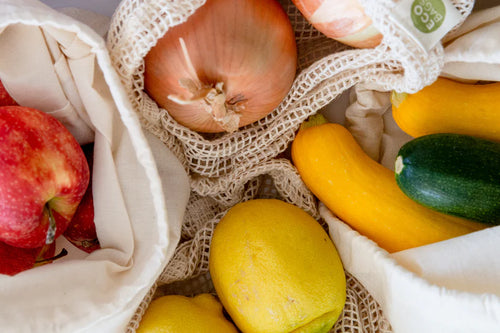6 Turkey Day Tips To Trim Your Waste on Thanksgiving

6 Tips To Have A More Eco-Friendly Thanksgiving — Enjoy The Holidays And Save The Planet!
Estimated Read Time: 8 minutes
Edited November 2022.
There’s no way around it — the past few years have been rough. From wildfires to hurricanes to wars to the pandemic, not one person has been unaffected. While some parts of the world are back to ‘normal’ again, the past couple of years have felt like a wake up call from mother nature.
Thanksgiving is a time to gather with family and to be grateful, but we should be thinking about gratitude and mindfulness the entire year — not just the last two months.
Having a more eco-friendly Thanksgiving involves thinking about the dramatic spike in organic waste, food miles (the distance your food commutes to get to your dinner table), and air travel that comes with the holidays. And what steps we can take to reduce this waste.
Because if there’s anything humanity is capable of, it's rallying around a cause and inciting change.
Check out these 6 Turkey Day Tips you can count on to have a more eco-friendly Thanksgiving.
6 Turkey Day Tips for A More Eco-Friendly Thanksgiving

Photo by Christina Rumpf on Unsplash
1. Embrace Gratitude And Mindfulness
We know practicing gratitude and mindfulness is important for our mental health, but what if we told you it could help you (and others) be more sustainable?
Studies show practicing mindfulness increases compassion and empathy, and helps us focus on our goals and values instead of trying to keep up with others.
This Thanksgiving, spend time being grateful for the people you’re with, but also the food on your table, the people who cooked it, the ones who transported it, and the farmers who grew it.
To practice gratitude and mindfulness throughout the year, spend 5-30 minutes each day in the moment. Focus on your surroundings, spend time in nature, pay attention to your thoughts and feelings, and make a daily list of things you’re grateful for.
2. Eat More Plant Based
If you’ve heard it once you’ve heard it a million times — reducing your meat consumption can help the Climate Crisis. For many reasons such as reduced deforestation, lower water usage, less biodiversity lost, and more.
We’re not saying to ditch the turkey altogether and go full vegan — but if you want to do that let us know how it goes!
Instead of having Turkey AND Ham, opt for one and replace the other with a plant protein. Alternatively, see how many meals you can make with leftover animal proteins without buying more.
Some of our favorite food bloggers to get some inspiration from:
- Jessica in the Kitchen
- Murielle Banackissa
- Zero Waste Chef — Not only can you find an entire zero waste thanksgiving menu, but also a recipe to do something with those leftover pumpkins!
3. Explore Your Farmers Market

Photo by Somi Jaiswal on Unsplash
Big chain grocery stores and supermarkets typically rely on large, corporate farms to supply you with food that travels long distances to reach your dinner table.
Farmers markets, on the other hand, keep their aisles stocked with fresh, organic produce from small and mid-size farmers.
This Thanksgiving, hit up the local farmer’s market and make a dish around seasonal product.
What's in season in November?
- Pomegranates
- Cranberries
- Pears and Apples
- Brussel Sprouts
- Sweet Potatoes
- Butternut, Acorn, Kabocha, Spaghetti, Delicata Squash
- Kale and Chard
- Procini Mushrooms
- Walnuts, Almonds, Pecans
- Prickly Pear
When you shop at a farmers market, your money supports the livelihoods of local farmers, whose sustainable farming practices provide whole foods that sustain your community. Locally-grown produce also minimizes food miles, as well as your pesticide intake for a more eco-friendly Thanksgiving.
4. Reduce Food Waste For A More Sustainable Thanksgiving

We eat a lot on Thanksgiving. And we also send a lot to the landfills.
- An estimated 200 million pounds of turkey
- 40 million pounds of mashed potatoes
- 30 million pounds of stuffing will get tossed in the trash can this Thanksgiving.
Have a more sustainable Thanksgiving by making less food waste using the tips below.
Plan Out Your Feast for Minimal Waste
Before grocery shopping, get a head count and use this Guestimator to help figure out how much food you’ll need for everyone.
- Make a list before heading to the store.
- Buy only what’s on that list
- Do not go to the store hungry!
You’ll reduce the amount of trips you take, save money, prevent food waste, and reduce your carbon emissions! Not bad for a day's work.

Set Up An Eco-Friendly Leftover Station
Encourage guests to bring their own food storage containers then set up a leftover station after the meal where guests can help themselves.
If you’re a guest, bring your own reusable containers, such as this Stainless Steel 2-Tier Lunchbox and/or Stasher Bags for leftovers.
Repurpose Your Leftovers To Ensure They’ll Get Eaten
Sure, there’s nothing like a leftover thanksgiving sandwich, but for how many days? With a simple online search for “Thanksgiving leftover recipes” (or at Zero Waste Chef) you can find countless ways to give your Turkey Day scraps a delectable facelift.
Use your eco-safe Stasher Bags to keep food fresher for longer and your leftovers more flavorful.

Compost What You Can't Consume
You might be surprised at all the leftovers and inedible food waste that you can easily compost. While meats and dairy should always be kept out of (most) composts, all other food and scraps are fair game! Uncoated paper products, such as plates, cups, paper towels, and cardboard food packaging are also great additions for your pile.
Get together with other family members and even neighbors to collect food waste and make one trip to the community compost if you have one available. Getting into the habit of minimizing your food waste all year can dramatically reduce your carbon footprint.
5. Say No To Disposables And Yes To Reusables

Paper products account for nearly 30% of all the trash sent to landfills each year. Try to resist the temptation of using paper, plastic, and the dreaded styrofoam products at your annual feast for the sake of the planet.
Instead of disposable tableware, use your favorite set of dishes and utensils, and replace the paper towels & napkins you normally might use with tree-free reusable products. Reusable Paper Towels will add more color to your table and less waste for your trash can. If you’re in need of extra tableware, head over to your local thrift store and see what you can find (check for food storage containers while you’re there).
6. Sustainable Travel is Smart Travel

The Wednesday before Thanksgiving is one of the busiest days to travel in the year. Automobile travel alone adds up to an extra 4 million metric tons of carbon emissions being released into the atmosphere. That’s not even accounting for the 31 million traveling by airplane this holiday.
Go Virtual
We’ve been there and done it but if you have the opportunity to do a virtual holiday you could be saving big on carbon emissions. With gas prices so high, opt for a virtual holiday and travel in the off-peak season to see family. You might even find you’re less stressed not having to plan multiple family trips, gatherings, and menus.

Photo by Sebastien LE DEROUT on Unsplash
Bus & Trains Provide More Sustainable Options
What if we told you you could travel to your holiday plans without getting stuck in traffic, absolutely no road rage, all while spending quality time with your family (or peaceful time reading, working, or sleeping)?
You can when you travel by bus or railway! One bus can replace up to 55 cars on the road, and trains emit around 70-75 percent fewer emissions when compared to cars and airplanes. In addition to reducing roadway congestion, consuming less energy, and saving you gas your holiday is instantly friendlier to the planet.
Purchase Carbon Offsets
If you must travel this Thanksgiving, buying carbon offsets can keep your commute ‘carbon neutral’. Carbon offsetting is a method in which you can use one emission-reducing action to compensate for carbon emissions produced with another activity. By purchasing offsets, your money directly funds environmental projects that remove greenhouse gasses from the air.
Any way you slice it, these are just a few of the many simple ways to incorporate more eco-friendly practices for a sustainable thanksgiving this year. Most important of all, be safe and stay grateful!
Written by Lauren Plug, content creator for ZeroWasteStore & Sustainability Enthusiast!

